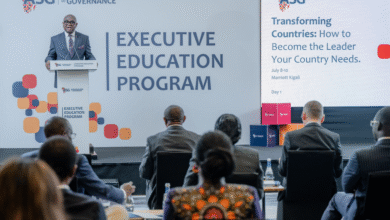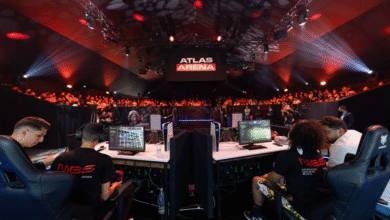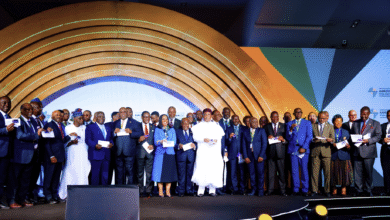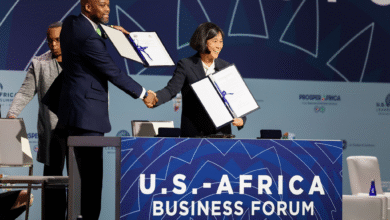Investors, financiers, politicians, are invited to the second edition of the African Economic and Consular Days. This event taking place from 3 to 5 June 2016 in Marseille is organized by the Mandela Institute, in partnership with the Municipality of Marseille, the Chamber of commerce and Industry of Marseille-Provence, the Chamber of Commerce and Industry of the PACA region, the Mediterranean Villa & AVITEM as well as the US State Department. An opportunity to reinforce the cooperation between companies and investors in France and Africa. ANA leapt at the opportunity to take stock with Maliza Said Soilihi, City Councillor delegated to the Assistant in International and European Relations, also member of the Mandela institute.
She is very involved with Paul Kananura, president of the Mandela Institute, to develop activities with a dual role. As a member of the Mandela institute, but also as an elected representative of Marseille. Maliza Said Soilihi’s mission, among others, is to mobilize actors both abroad and in France. She is constantly looking for partners, sponsors, in other words any organization able to bring a stone to the edifice.
Interview
What role does the Mandela Institute in the development of Africa?
The Mandela Institute based in Bordeaux works towards the development of Africa. We regularly try to organize conferences around the economy but also for security and governance in Africa … Since last year, the Institute organizes an economic forum. The 1st edition of the African Economic and Consular Days was held in Bordeaux, last year under the aegis of the trade minister of the Ivory Coast. This year, I pleaded to organize this event in Marseille .The Municipality of Marseille has agreed to be partner of the event, and other associative structures, present here, not to mention young African start-ups invited for the occasion. Institutional partners, including the Chamber of Commerce, are also awaited. We tried to mobilize local actors to arrange a meeting at a high economic level. In addition, four government delegations have confirmed their attendance.
Can you come back to the objectives of this forum?
The goal is to enable African countries through their minister or chancellor, to come and present the potential and the business climate of their country, to European companies and investors who are interested to invest in Africa. The fields of energy and infrastructure are highly concerned. We want to create a bridge between France and African countries, to help organize B to B meetings. Thus, interested companies who do not have access to these African countries can meet and conclude contracts. This commitment also applies in the opposite direction by inviting African companies wishing to expand their market in France. Our desire is to create an economic bridge between the two sides.
What are the good points of this first edition?
Last year, there were several investment delegations and several contracts were signed. Among them, we could count the Mauritanian delegation, back to Bordeaux to sign contracts with local companies. More than a hundred contracts were signed during this first edition. It was a good start. The Mandela Institute followed up B to B appointments that were organized. This year the goal is even more important since the aim is to perpetuate this African economic high-level event organized every year. Last year, there have been 250 participants, and this year our goal is to count 350 to 400 participants, from delegations to company members. Note that among the invited African companies, we promote African start-ups operating in France and wish to also thrive here and there. Among the government representatives, ministers from Niger, Congo Brazzaville, Madagascar and Senegal will be present during these days. For now, it is those who have confirmed their presence among government organizations. Are also invited the ambassadors of Namibia and Comoros among others. In the best case scenario, seven ministers will therefore be present.
How was the organization of this event?
The Mandela institute took charge of raising awareness among African countries, embassies, government … Paul Kananura has also had numerous meetings with the ambassadors to demonstrate, based on the business climate, potential investments. Next, the Chamber of Commerce of Marseille tries to mobilize local actors, such as companies that may be interested to expand in Africa, but who do not have sufficient information and contacts in order to do so. As for us at the city council, we try to raise institutional awareness, AFD (French Development Agency), Jean-Louis Borloo, who is going to present its energy foundation for Africa. We have divided the roles. The partners are also trying to educate organizations interested in economic development in Africa in the future. We divided the roles so that each partner can mobilize its sector. We try to convince them that this is a way to be able to make relevant economic meetings and to provide, in this way, our contribution to the African development.
What are the sectors concerned by this event?
We do not want to close the door. Any person or entity is welcome. However, we prioritize areas such as energy, health, construction, infrastructure, not forgetting, innovation, telecommunications … This event will take place over two days. The first day is attributed to the official delegations presenting business climate. Each minister, ambassador or director of investment services will present legal climate specific to their county, as well as the priority needs and activities. On Saturday will be held, round tables with specialist stakeholders such as the director of the African Development Bank, a professor at UNESCO specialized in the digital sector in Africa, among others. We have invited experts who will come to explain or discuss investment opportunities, financing, and most promising sectors in Africa. This event is open to all public. Students, who have the ambition to start their own businesses, may also take part. Thus, they can gather information on how to raise funds on growth sectors. On Saturday afternoon, B to B meetings will take place. We allow companies to take appointments with delegations. Thus, everyone can discuss, aside, on the potential economic opportunities. The Mandela Institute monitors, at this point, whether the contracts are about to be signed, under what conditions, and what types of contracts.
What are the objectives of the African Economic and Consular Days in the long term?
First and above all, we wish to reassure on the African economic potential. We still have trouble to convince on the interesting perspectives offered by the continent. Indeed, today, Africa can boast a significant growth rate. Africa can also offer Win/ Win partnerships, in the manner of Angola, which, in recent times, bought a number of industries in Portugal. The objective is to demonstrate that companies here and there or states in Africa can sign balanced contracts. We want to continue to organize and facilitate, between companies and institutions, meetings that would not have been possible in a different context.
What could be the impediments to investment?
Insecurity is, in my opinion, the first fear that prevents people from investing in Africa. The lack of information is also among the barriers to investment. Many are unaware of the investment opportunities in some African countries as well as customs, tax incentives that have been introduced in some states. Through this event, we also wish to provide information. Also, the media do not address the African issue through potentials, but focus on the problems. So we want to provide a different light and perpetuate this event. I clarify that we have no subsidies, contributions or sponsorship. We have then no funding.
By Darine Habchi







